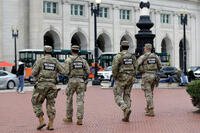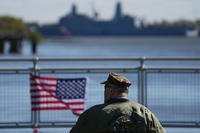Military entry-level training, like most things in 2020, has been anything but normal this year.
Recruits have spent the weeks leading up to boot camp or basic training sequestered in dorm rooms and hotels. Hundreds of Navy recruits made headlines in the spring when they were quarantined at an indoor Illinois water park, not far from Great Lakes Training Center -- though the waterslides weren't actually up and running.
Earlier this year, the pandemic forced all the services to temporarily pause the shipment of incoming recruits as leaders scrambled to put in place new policies to prevent a dangerous virus from infiltrating their training camps. Normally tightly packed racks were spread out in squad bays, washing stations were installed outside chow halls, and recruits were forced to shelter in place for two weeks before beginning training, with the hope of catching any virus symptoms before they entered the tightly controlled boot camp environment.
Read Next: 3 Female Marine Officers to Attempt Infantry Officer Course as Another Graduates
The efforts haven't been cheap, and they're not perfect. But leaders say they've led to unexpected benefits: fewer sick calls, more focused recruits and lower attrition rates.
Take Marine Corps boot camp. Normally, when a recruit shows up, they've been traveling all day. They arrive at the recruit depot in the dark of night, sleep- and food-deprived, and immediately have a drill instructor screaming in their face, said Maj. Gen. Jason Bohm, head of Marine Corps Recruiting Command.
All of that is by design, he added, "to shock the system, to start their transformation process."
"[But] now they've actually had two weeks to rest from that travel from home before they commence training, and what that has done is given us recruits who are a little bit more focused on being able to understand what they're being told by the drill instructors," Bohm said. "Although it's just as challenging and just as chaotic, we're getting a little bit better of a response from them."
Crushing the 'Crud'
Even in normal times, cramming recruits who've come in from all over the country into tightly packed barracks and squad bays results in illness.
"Every officer candidate class, every recruit training class gets some kind of crud in the first two weeks, and it shuts them down," Commandant Gen. David Berger, the Marine Corps' top general, told lawmakers this month.
That's no longer the case, he said, since the Marine Corps introduced new measures to restrict incoming recruits' movements prior to starting boot camp. Trainees now spend two weeks sequestered at hotels to help catch possible COVID-19 symptoms. The recruits use the time, according to training officials, to mentally prepare for the task ahead.
"Why would we not consider continuing that later on so ... everybody can train instead of half the squad bay being sick?" Berger said. "Some of these measures we need to keep in place afterward."
Army Undersecretary James McPherson said the same is true for his service. After the pandemic hit in March, Basic Combat Training centers started 14-day monitoring phases in which groups of up to 30 trainees remain off base in case any develop COVID-19 symptoms.
They spend most of that time exercising or at outdoor classroom-style skills sessions they typically cover during basic training.

"We give them ... the same classroom instruction they would have received in their eight weeks, but we have compressed it," McPherson said. "And what we have discovered was, we have a tremendously [lower] attrition rate [by] giving them two weeks of classroom upfront."
The Army will continue with that model even after the pandemic, he added, "because we discovered it really does help us with our attrition."
"We would have never known that had we not had COVID-19 hit us," McPherson said.
So far, the Army has seen attrition rates drop from 10.8% to 7.58% in BCT and one station unit training, Maj. Gen. Lonnie Hibbard, commander of the Center for Initial Military Training, told Military.com. For a service that trains about 60,000 recruits per year cycle, the drop in attrition makes a big difference.
"We graduated about 2,800 more trainees this year than we did last year at the same time," Hibbard said, cautioning that it may be too early to say the decrease is solely attributable to the new college-style, two-week entry into the Army.
"Right now, the data is very, very promising. We are continuing to refine it," he added.
Marine Corps boot camp attrition rates hover between 12% and 16%, said Capt. Sam Stephenson, a Training and Education Command spokesman. Numbers have been slightly lower during the pandemic, he said, but since attrition fluctuates for a variety of factors, it's difficult to know whether the changes are directly related to the pandemic.
The Navy, which has been shipping the maximum number of recruits that the Great Lakes Training Center in Illinois can hold, has also seen declining attrition rates, said Rear Adm. Dennis Velez, the head of Navy Recruiting Command.
"I think some of that has to do with those extra two weeks of acclimation period that the future sailors are having to get used to the military environment before they really go into boot camp," he said.
The average boot camp attrition rate dropped by more than 5%, said Lt. Kristina Wiedemann, a Navy Recruit Training Command spokeswoman. They are seeing benefits to the 14-day restriction-of-movement period, which is now held at Fort McCoy, Wisconsin.

The recruits conduct initial familiarization training there, which Wiedemann said provides information "crucial to their success during boot camp, as well as for their continued success in the Navy."
She also credited the declines to several other factors, including more mental health support and religious ministry availability at boot camp; a new progressive aerobic cardiovascular endurance run test, which measures initial cardiovascular capacity; and the addition of a low-impact fitness week, during which recruits wear tennis shoes instead of boots, reducing lower extremity injuries.
For now, she said, it's too early to say whether any new health measures introduced during the pandemic will remain in place once it ends.
A Softer Landing?
Benefits aside, any changes to basic training and boot camp are quick to draw criticism from those who view their own experiences as having been tougher.
As the former head of Marine Corps Training and Education Command once put it, Marines have likely been complaining about falling standards since 1775.
"I'm assuming that the second Marine walking into Tun Tavern was like, 'You know ... our standards have gone down. They're just not the same that they used to be,'" now-retired Maj. Gen. William Mullen once put it, referring to the service's famous birthplace.

But leaders say that adopting changes proven to improve the process makes sense.
"If I am doing all of the same tasks, but I am doing them in a different order and changing the way I present it, am I getting softer?" said Hibbard, with the Army's Center for Initial Military Training.
The Army also recently moved completely away from a rite of passage on Day One of Basic Combat Training known as the shark attack -- a chaotic ritual in which drill sergeants descend on terrified recruits, yelling commands and ordering them to perform exercises with packed duffels strapped to their backs.
That has been replaced with a new program called the "First 100 Yards," which involves a series of physical and mental challenges designed to build trust in drill sergeants and teammates.
It wasn't easy to break drill sergeants of their old training habits, Hibbard said, but the social-distance requirements set in place during the pandemic made it easier for some to adapt.
"Culture is the hardest thing in the Army to change," he said. "[But] when you put a mask on and you have to stay six feet away, COVID-19 was a forcing function to change culture because you couldn't do things the way you were doing it before."
In the end, training is about building trust, not fear, Hibbard said.
"If we don't get after that environment of trust, we are never going to get after the corrosives in the Army and start changing the culture from Day One," he said.
Bohm said he has zero concerns about the Marine Corps turning out softer leathernecks during the pandemic -- or later, if they end up adopting some of the new health measures over the long term.
"Boot camp is as challenging as it always has been," he said.
-- Gina Harkins can be reached at gina.harkins@military.com. Follow her on Twitter @ginaaharkins.
Related: Female Recruits to Train at Marines' All-Male San Diego Boot Camp in Historic First















